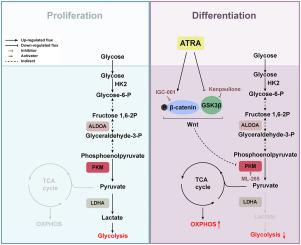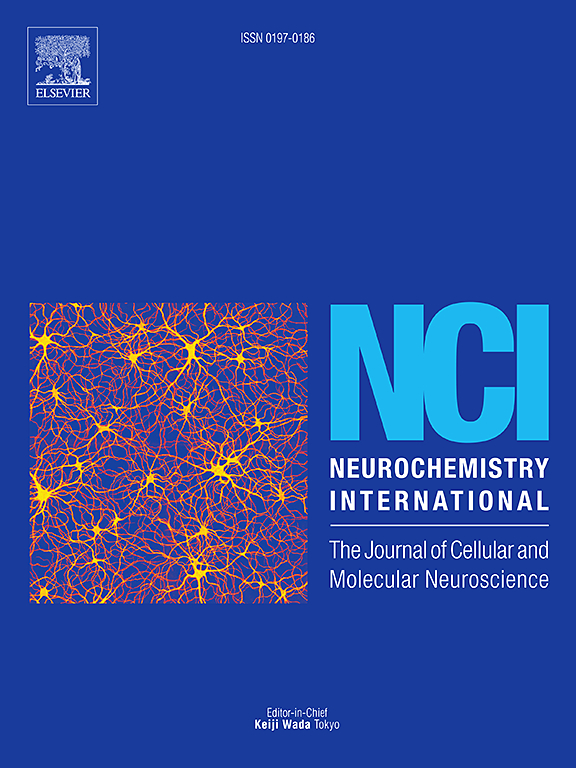Wnt/丙酮酸激酶、肌肉轴在小鼠神经母细胞瘤细胞的分化过程中起着至关重要的作用。
IF 4.4
3区 医学
Q2 BIOCHEMISTRY & MOLECULAR BIOLOGY
引用次数: 0
摘要
神经元分化和神经元生长是神经系统发育的重要过程,受多种因素调控。尽管已证明全反式维甲酸(ATRA)可通过激活包括 Wnt/β-catenin 信号转导在内的多种途径介导小鼠神经母细胞瘤细胞的分化,但其机制仍不清楚。丙酮酸激酶(PKM)在神经母细胞瘤细胞的糖酵解过程中发挥着重要作用,并调控着各种癌细胞的 Wnt 信号通路。在本研究中,我们假设 Wnt/PKM 轴调控神经母细胞瘤细胞(Neuro-2a 和 N1E-115)的分化。为了验证这一假设,我们在ATRA诱导分化的Neuro-2a和N1E-115细胞中使用了Wnt/β-catenin和糖酵解通路的抑制剂和激活剂,并建立了沉默或突变替代Pkm的细胞系。Western 印迹和 qPCR 显示,ATRA 处理激活了 Wnt 信号通路,抑制了 PKM 介导的糖酵解。在分化过程中,耗氧率(表明氧化磷酸化)显著增加,而细胞外酸化率(表明糖酵解)显著降低;抑制PKM后,这些效应被逆转。Wnt抑制剂ICG-001和PKM激活剂ML-265抑制了ATRA诱导的Neuro-2a和N1E-115分化,而RNA干扰介导的Pkm沉默促进了Neuro-2a和N1E-115分化,PKM过表达逆转了这一效应。用Wnt激活剂kenpaullone处理可促进Neuro-2a和N1E-115的分化,而服用ML-265可逆转这种分化。这些结果表明,在ATRA诱导的分化过程中,Wnt/β-catenin信号通过抑制PKM介导的糖酵解促进了Neuro-2a和N1E-115的分化。这些发现可能为糖酵解在神经分化中的作用提供了新的理论依据。本文章由计算机程序翻译,如有差异,请以英文原文为准。

The wnt/pyruvate kinase, muscle axis plays an essential role in the differentiation of mouse neuroblastoma cells
Neuronal differentiation and neurite growth are essential processes in nervous system development and are regulated by several factors. Although all-trans retinoic acid (ATRA) has been shown to mediate the differentiation of mouse neuroblastoma cells via the activation of several pathways, including Wnt/β-catenin signaling, the mechanism remains unclear. The pyruvate kinase, muscle (PKM) plays an important role in the glycolysis of neuroblastoma cells and regulates the Wnt signaling pathway in various cancer cells. In this study, we hypothesized that the Wnt/PKM axis regulates the differentiation of neuroblastoma cells (Neuro-2a and N1E-115). To test this hypothesis, we used inhibitors and activators of the Wnt/β-catenin and glycolytic pathways in ATRA-induced differentiated Neuro-2a and N1E-115 cells and established cell lines with silenced or a mutant replacement of Pkm. Western blot and qPCR showed that ATRA treatment activated the Wnt signaling pathway and inhibited PKM-mediated glycolysis. The oxygen consumption rate (indicating oxidative phosphorylation) significantly increased, whereas the extracellular acidification rate (indicating glycolysis) significantly decreased during differentiation; these effects were reversed upon PKM inhibition. The Wnt inhibitor ICG-001 and PKM activator ML-265 inhibited ATRA-induced Neuro-2a and N1E-115 differentiation, whereas RNA interference-mediated Pkm silencing promoted Neuro-2a and N1E-115 differentiation, which was reversed by PKM overexpression. Treatment with the Wnt activator kenpaullone promoted Neuro-2a and N1E-115 differentiation, which was reversed by ML-265 administration. These results indicate that Wnt/β-catenin signaling promotes Neuro-2a and N1E-115 differentiation by inhibiting PKM-mediated glycolysis during ATRA-induced differentiation. These findings may provide a new theoretical basis for the role of glycolysis in nerve differentiation.
求助全文
通过发布文献求助,成功后即可免费获取论文全文。
去求助
来源期刊

Neurochemistry international
医学-神经科学
CiteScore
8.40
自引率
2.40%
发文量
128
审稿时长
37 days
期刊介绍:
Neurochemistry International is devoted to the rapid publication of outstanding original articles and timely reviews in neurochemistry. Manuscripts on a broad range of topics will be considered, including molecular and cellular neurochemistry, neuropharmacology and genetic aspects of CNS function, neuroimmunology, metabolism as well as the neurochemistry of neurological and psychiatric disorders of the CNS.
 求助内容:
求助内容: 应助结果提醒方式:
应助结果提醒方式:


